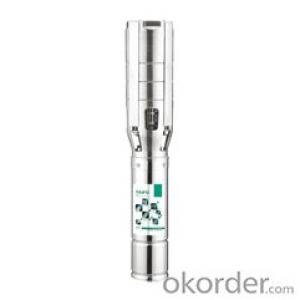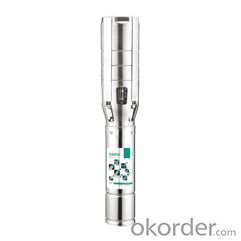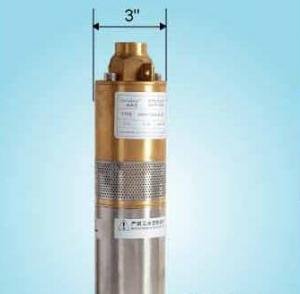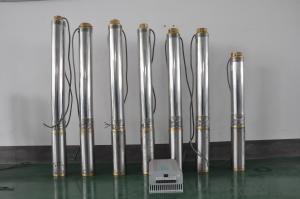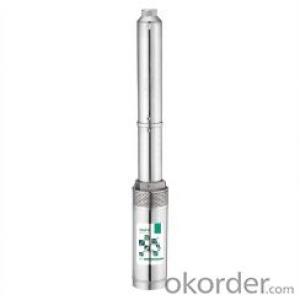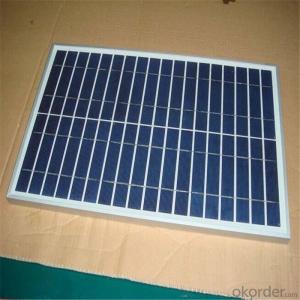Jintai Solar Pump 5tsc Stainless Steel CE Solar Panel
- Loading Port:
- Shanghai
- Payment Terms:
- TT OR LC
- Min Order Qty:
- 50 pc
- Supply Capability:
- 100000 pc/month
OKorder Service Pledge
OKorder Financial Service
You Might Also Like
1.APPLICATION AREA:This project products are mainly used in dry region for irrigation of agriculture, It can be used for drinking water and
living water. The living condition could be much improved. It also can be used for fountains.2.MATERIAL OF PARTS:Outlet: stainless steel
Pump body: stainless steel
Motor body: stainless steel
Bearing: C&U
3.ADVANCED TECHNOLOGY:1.Application innovation
Compared with the traditional alternating current machine, the efficiency is improved 25% by the permanent magnetism, direct current, brushless, non-sensor motor.
2.Technics innovation
Adopt double plastic package for rotor and stator, motor insulation≥300MΩ, the motor security was much improved.
3.Structure innovation
Oil filling, convenient installation and environmental protection4.HIGHLIGHTSa.Energy-saving and environment-protected green products
b.High technique products adopting MPPT and DSP chip technique.
c.100% copper wire, cold-rolled silicon steel sheet
d.CE certificate
e.Advanced three phase brushless DC motor
f.Stainless steel 316 screws
g.3 years warranty5.PRINCIPLE OF OPERATION:Solar panel collects sunlight→DC electricity energy → solar controller(rectification,stabilization,amplification,filtering)→available DC electricity→(charge the batteries)→pumping water6.ADVANTAGES OF SOLAR PUMP SYSTEM:A.It is easier and more widely used than any other dynamoelectric driven pumps.
B.It is more economical and more environmentally friendly.7.MODEL SELECTION:a.The power of solar panel = power of pump ×1.3
The voltage of solar panel = the voltage of pump
The controller should be matched
b.Select the batteries according to the following formulas:
The use hour of battery =
The battery capacity ÷(the machine power÷the battery voltage)×0.6 For example,the machine power is 200W, the battery
capacity is 100AH,the voltage is 12V,and the battery is fully charged,then the use hour is:100÷(200÷12)×0.6=3.6hours
c.The battery capacity=
the use hour ÷0.6×(the machine power÷the battery voltage) For example,the machine power is 200W,the battery voltage
is 12V,and the battery need to be used for 3.6hours,then the battery capacity is:3.6÷0.6×(200÷12)=100AH

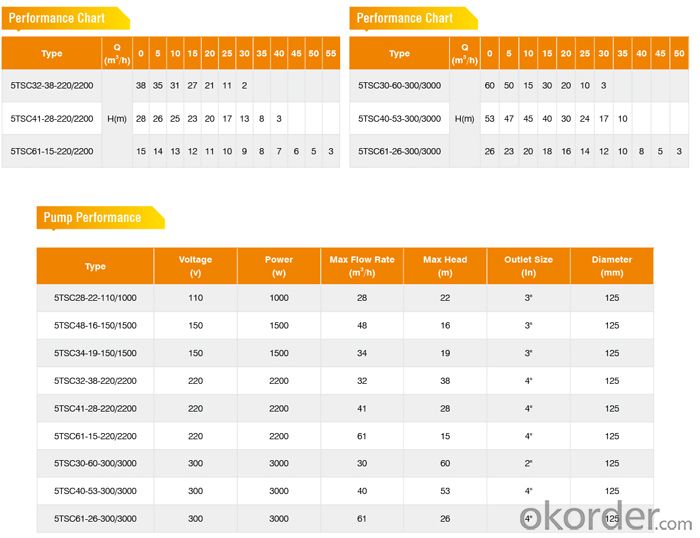
- Q: Can solar pumps be used in conjunction with rainwater harvesting systems?
- Yes, solar pumps can indeed be used in conjunction with rainwater harvesting systems. Solar pumps are a sustainable and cost-effective way to extract and distribute water, making them a perfect match for rainwater harvesting systems. The solar panels provide the necessary power to run the pump, allowing water to be efficiently pumped from the rainwater storage tanks for various uses such as irrigation or domestic needs. By combining solar pumps with rainwater harvesting systems, individuals can maximize water usage while minimizing dependence on traditional electricity sources.
- Q: How does a solar pump handle water pressure fluctuations?
- A solar pump handles water pressure fluctuations by utilizing a built-in controller that adjusts the pump's speed based on the available sunlight. This allows the pump to maintain a consistent water pressure, even when there are fluctuations in the solar energy input.
- Q: Can a solar pump be used for water supply in off-grid dairy farms?
- Yes, a solar pump can be used for water supply in off-grid dairy farms. Solar pumps are an ideal solution for off-grid locations as they rely on solar energy to power the pump, eliminating the need for grid electricity. They can efficiently pump water from wells, boreholes, or other water sources to meet the water requirements of dairy farms. Additionally, solar pumps are cost-effective, environmentally friendly, and require minimal maintenance, making them a suitable choice for off-grid dairy farms.
- Q: Are there any limitations on the water pressure or flow rate for a solar pump?
- Yes, there are limitations on the water pressure and flow rate for a solar pump. The specific limitations depend on the capacity and design of the solar pump, as well as the available solar energy. Generally, solar pumps have a maximum pressure and flow rate specified by the manufacturer. These limitations ensure the efficiency and longevity of the pump system and prevent any potential damages.
- Q: Can a solar pump be used for water supply in a desert?
- Yes, a solar pump can be used for water supply in a desert. Solar pumps use solar energy to power the pump and can be an efficient and sustainable solution for water supply in remote and arid areas like deserts, where access to electricity may be limited. These pumps can draw water from underground sources or utilize existing water bodies, helping to meet the water needs of communities, agriculture, or livestock in desert regions.
- Q: How does a solar pump handle debris in the water source?
- A solar pump typically uses a filter or a strainer to prevent debris from entering the pump and clogging it. This helps maintain the efficiency and longevity of the pump while ensuring that the water source remains clean.
- Q: Can a solar pump be used for water purification systems?
- Yes, a solar pump can be used for water purification systems. Solar pumps are commonly used to draw water from a source and transfer it to a water purification system. The solar energy powers the pump, eliminating the need for electricity and making it an environmentally friendly option for water purification.
- Q: Can a solar pump be used in areas with limited access to transportation for maintenance visits?
- Yes, a solar pump can be used in areas with limited access to transportation for maintenance visits. Solar pumps are designed to be self-sufficient and low maintenance, requiring minimal upkeep. They operate using solar energy, which eliminates the need for fuel or electricity, making them highly suitable for remote areas. Additionally, solar pumps are often built with durable and long-lasting materials, reducing the frequency of maintenance visits. However, in case of any maintenance requirements, local technicians or maintenance teams can be trained to handle minor repairs and replacements, minimizing the need for transportation to remote locations.
- Q: Are solar pumps suitable for use in construction sites?
- Yes, solar pumps are suitable for use in construction sites. They are a practical and eco-friendly solution that can provide a reliable water supply for various construction needs, such as dust control, concrete mixing, and general water usage. Solar pumps are easy to install, require minimal maintenance, and operate silently, making them ideal for construction environments where noise and emissions can be a concern. Additionally, their ability to operate independently from the electrical grid makes them versatile and cost-effective, especially in remote or off-grid construction sites.
- Q: Can a solar pump be integrated with other renewable energy sources like wind turbines?
- Indeed, a solar pump has the capability to be integrated with alternative renewable energy sources such as wind turbines. This integration, referred to as hybrid renewable energy systems, allows for the enhancement of power generation efficiency and reliability. By combining the intermittent nature of wind power with the consistent power generation of solar energy, a hybrid system can provide a more stable and dependable power supply for the solar pump. The integration of a solar pump and wind turbine can be achieved through the utilization of a hybrid controller or an inverter. These devices effectively manage the flow of power between the two sources. The controller ensures that the power generated by each source is efficiently utilized and, if necessary, stored in a battery bank for future use. During periods of low sunlight, the wind turbine can supplement the power requirements of the solar pump, ensuring continuous operation. Similarly, when there is insufficient wind, the solar panels can compensate by providing the necessary power. This hybrid approach maximizes the utilization of available renewable energy resources, reducing dependence on non-renewable energy sources and promoting the overall sustainability of the system. Furthermore, the integration of a solar pump with a wind turbine can also help overcome the limitations of each energy source individually. For example, wind power is generally more abundant at night, while solar power is at its peak during the day. By combining these two sources, the system can provide a more balanced and consistent power supply throughout the day and night. In summary, the integration of a solar pump with other renewable energy sources, such as wind turbines, offers substantial advantages in terms of increased power generation, improved reliability, and enhanced sustainability. This hybrid approach enables a more efficient utilization of available resources and contributes to the overall transition towards a cleaner and more environmentally friendly energy future.
Send your message to us
Jintai Solar Pump 5tsc Stainless Steel CE Solar Panel
- Loading Port:
- Shanghai
- Payment Terms:
- TT OR LC
- Min Order Qty:
- 50 pc
- Supply Capability:
- 100000 pc/month
OKorder Service Pledge
OKorder Financial Service
Similar products
Hot products
Hot Searches
Related keywords
